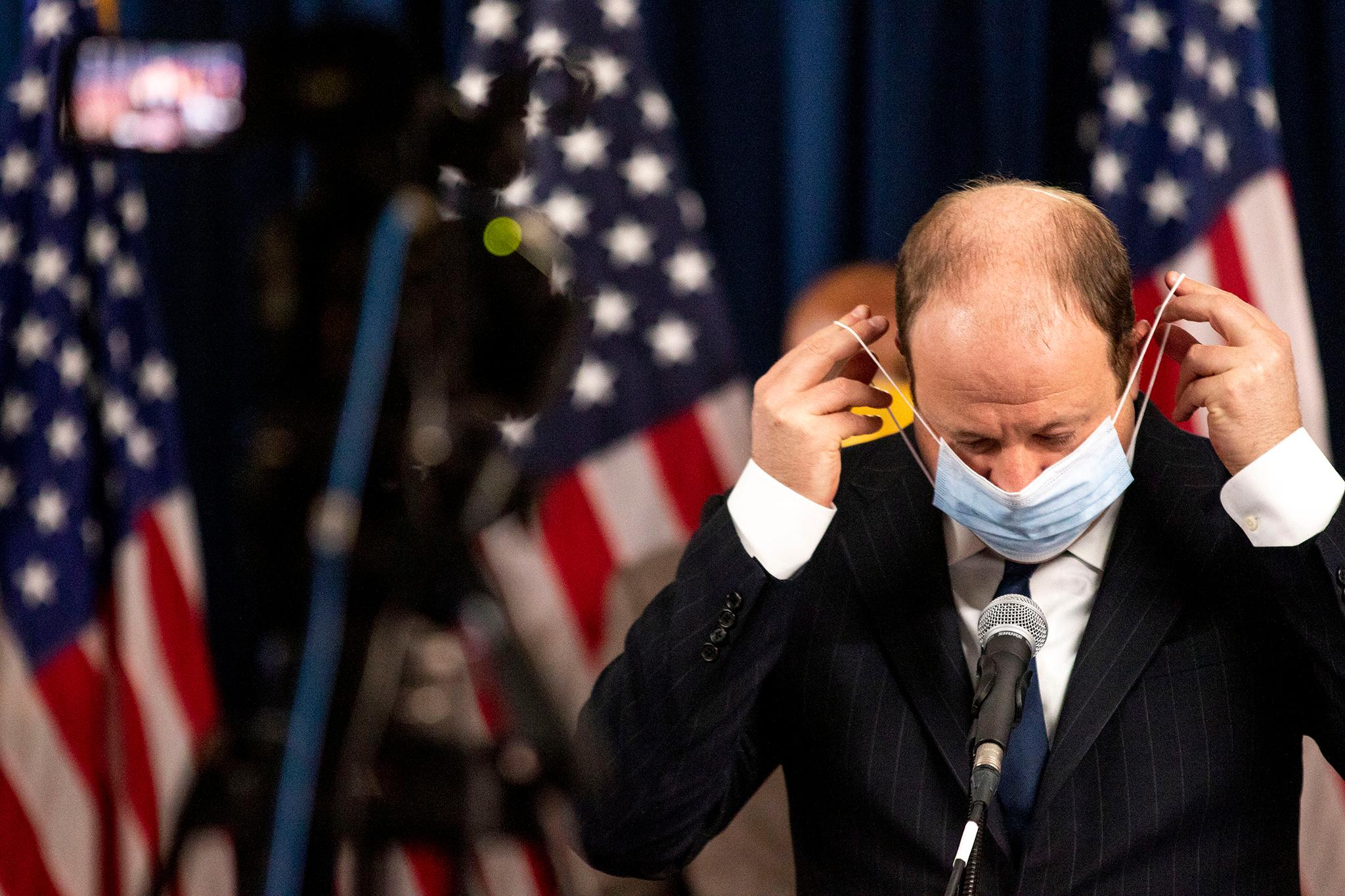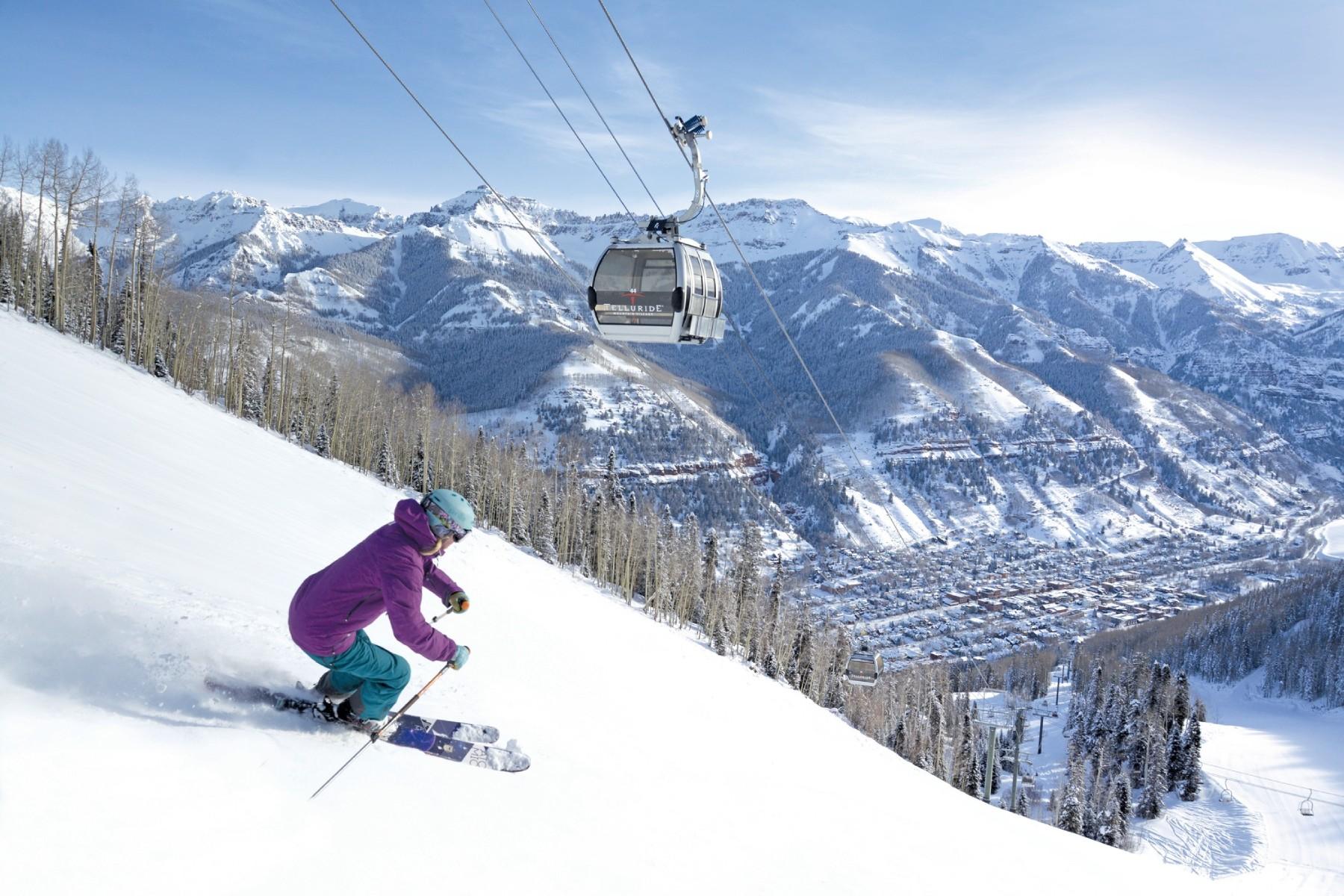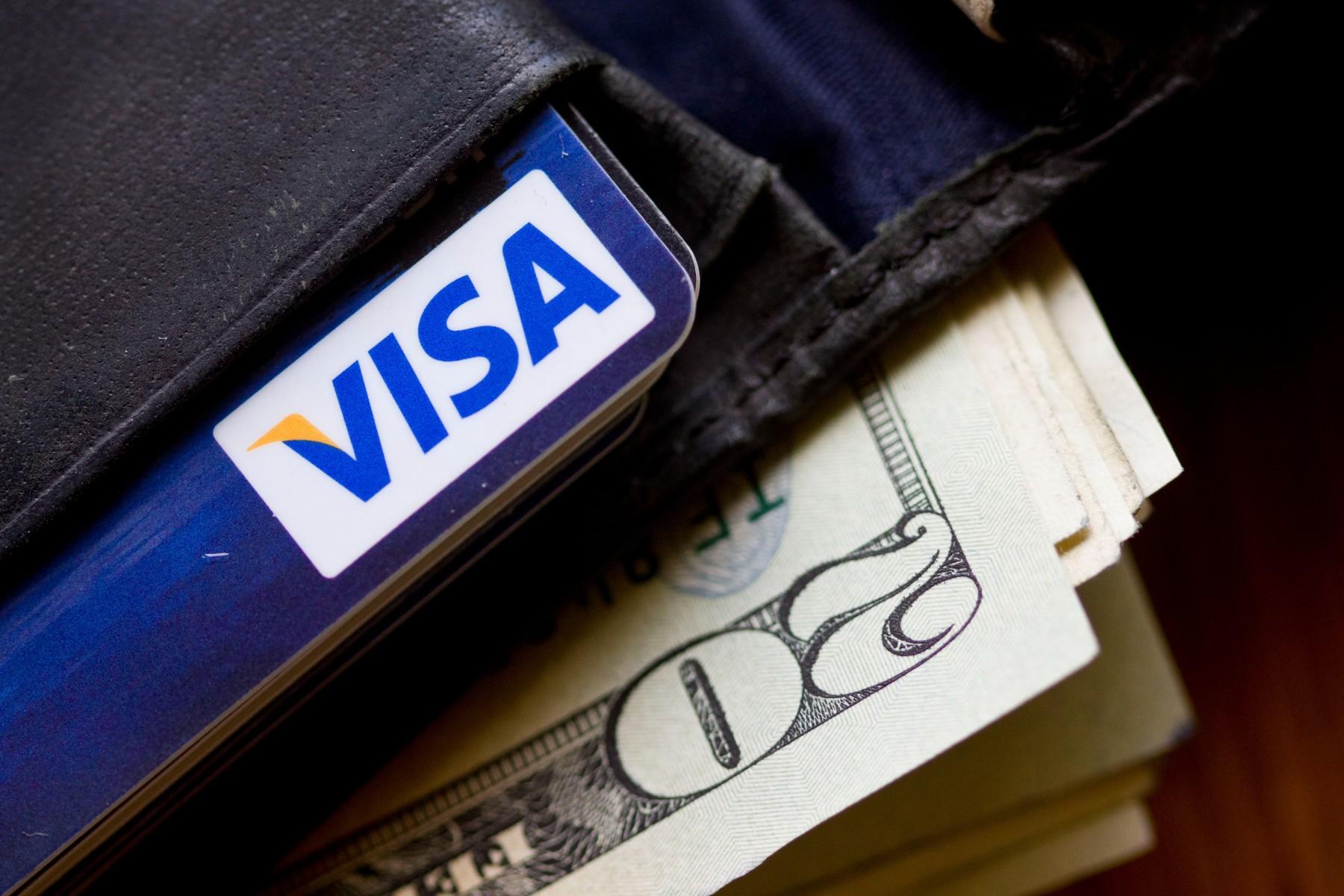
Colorado Gov. Jared Polis said he and first gentleman Marlon Reis are doing well after testing positive for COVID-19 on Saturday. Polis said he had a little trouble sleeping but that it was likely because he was worried about having the virus — both are asymptomatic with no fever or other symptoms.
“It’s a potentially deadly game of odds, and the odds are that Marlon and I won’t have to go to the hospital,” Polis told Colorado Matters host Ryan Warner.
“I just pulled the data and for folks that are 39-45 (in age), there's about a 4 percent chance that each of us will have to go, which is a better than likely chance we won't,” he said. “I'm just so happy of course, that we didn't have Thanksgiving with my parents. I haven't seen them in nine months. They’re 76 and my mom has respiratory conditions, so this is a very different trajectory for them.”
The governor said his positive COVID-19 diagnosis will not impact the special session he called, which will be focused on pandemic relief. The session begins on Monday, Nov. 30.
“I can sign a bill that's delivered to me and without contact, I can go out, grab it, sign it, put it back, spray it with Lysol and then put it back out,” Polis said.
Interview Highlights
On opening overflow facilities for hospitals
“We get real-time tracking daily on this. Now it's important to know that the Saint Mary's, the Convention Center, this is non-ICU space, but what it would allow is hospitals to convert additional non-ICU space into ICU space … We're not making the call to activate those sites, but if the trend doesn't change, that absolutely can need to occur in the next few weeks as it has happened in other states where the infection rate has gone even higher.”
“It's basically making sure that we don't run out of space. So we talked to the main hospitals every day, they actually under a relatively new executive order, give us bed numbers, ICU, non-ICU. It would likely first be one of the two smaller sites before the larger site. And we try to be a week or two ahead of it, meaning, we monitor the trajectory. And if we activate, it means that the models show that we will likely need them within two weeks. We are not yet there where we likely need them within two weeks. This disease is very modelable, meaning, Ryan, from cases today to hospitalizations is usually five or six days. To ICU usually is a few more days. Not all the time. I lost a friend who got COVID, was hospitalized two days later, intubated the next day, and died two days later. It can happen in five or six days too, but that's not the typical trajectory.”
On the special session focused on pandemic relief
“What we're looking for is aid for small businesses that are affected by capacity restrictions, like restaurants, tax relief, and direct aid, help for renters and landlords and child care assistance. There's a few other things — remote access for kids, food banks — but those are the big ones.”
On Thanksgiving as a potential super-spreader event
“Unfortunately the data that matters is what happens to COVID infection rate in a week. So we do have some proxies for travel, but it's really hard to tell who had large Thanksgivings, who didn't. We know some people did, maybe some of them wore a mask, maybe some of them did outside. We know a lot of folks, like my parents and especially folks that are more vulnerable, just had it themselves. And I'm grateful for that. When we talk about what we're grateful for this Thanksgiving, I'm grateful that so many Coloradans made the right choice to not expose their older relatives, to what could potentially be a deadly infection.”
_____________
Interview Transcript
Ryan Warner: Governor Polis, how are you and the first gentleman feeling?
Governor Jared Polis: Well, so far so good, Ryan. Asymptomatic, little trouble sleeping last night, but it's certainly likely that that was just from the worry of it. I'm not sure if it's a symptom or not. But no fever or anything yet. And as I said back, I think it was March or April, Ryan, I said I think I'm likely to get it, many are likely to get it. And sure enough, it took a while, but I did get it. And I'm hoping for the best.
RW: What do you say to people who think you're the guy who for months has been imploring us to wear masks and wash our hands and stay home. And of course, those are all things that scientists say make a difference. But if you got it doing all of those things, then either some people might wonder what hope is there for me or to heck with it, I'm going out for pizza with my besties.
JP: All this thing is, Ryan, is it's a potentially deadly game of odds and the odds are that Marlon and I won't have to go to the hospital. I just pulled the data and for folks that are at 39 to 45, there's about a 4% chance that each of us will have to go, which is a better than likely chance we won't. But that's odds number one. Odds number two, being reasonably careful. I mean, especially if you're in an at risk group. I am just so happy, of course, that we didn't have Thanksgiving with my parents. I haven't seen them in nine months. They're 76 and my mom has respiratory conditions. So this is a very different trajectory for them. But even for people in their 30s and 40s, Ryan, with a 4% chance of hospitalization, the danger is that everybody gets it at once. And then we're getting close to this now with one in 41. And if it gets much worse, we would run out of hospital space for that 2 or 4%, most of whom will make it through, some of whom won't. But if there's not space, then many of them wont make it through.
RW: Speaking of space, hospitalizations in Colorado of confirmed or suspected COVID 19 patients are above 1800. How close are you to ordering overflow facilities to prepare to open, be it at hospitals or those other overflow sites?
JP: Yeah. So we get real time tracking daily on this. Now it's important to know that the St Mary's, the Convention Center, this space, this is non ICU space. But what it would allow is hospitals to convert additional non ICU space into ICU space. Now, the hospital surge comes first. Many of them have already added beds, of course, since March, that's what they did with the time. At this exact juncture in time, we're not making the call to activate those sites. But if the trend doesn't change that absolutely could need to occur in the next few weeks as it has happened in other states where the infection rate has gone even higher.
RW: Do you have a specific trigger, a specific threshold?
JP: Well, yeah, I mean it's basically making sure that we don't run out of space. So we talked to the main hospitals every day. They actually under a relatively new executive order, give us bed numbers, ICU, non ICU. It would likely first be one of the two smaller sites before the larger site. And we try to be a week or two ahead of it, meaning we monitor the trajectory. And if we activate, it means that the models show that we will likely need them within two weeks. We are not yet there where we likely need them within two weeks. This disease is very modelable. Meaning Ryan, from cases today to hospitalizations is usually five or six days, to ICU usually is a few more days. Not all the time. I lost a friend who got COVID, was hospitalized two days later, intubated the next day, and died two days later. It can happen in five or six days too, but that's not the typical trajectory.
RW: This diagnosis comes as lawmakers began meeting in a special session focused on pandemic relief. This is a session that you called. What is non-negotiable for you in this special session?
JP: Well, first of all, me having COVID will not have any effect in the special session, nor will if there are currently any legislators under quarantine or with COVID. I know there have been. I don't know if there are any at this exact point in time. But none of that will affect it. They've made plans for folks to be able to participate remotely. I can sign a bill that's delivered to me and without contact, I can go out, grab it, sign it, put it back, spray it with Lysol, and then put it back out. But what we're looking for, Ryan, is aid for small businesses that are affected by capacity restrictions, like restaurants. Tax relief and direct aid. Help for renters and landlords and child care assistance. There's a few other things, remote access for kids, food bank, but those are the big ones.
RW: How do you think you got this?
JP: Well look, I mean, nobody ever will know for sure. I was under quarantine advisory, had a likely exposure and potentially other exposures. But like a lot of folks, I also went to the grocery store, the pharmacy. Thankfully my testing caught it early enough, which leads me to believe that at least in my chain of transmission, I didn't give it to anybody else. So at least it was thankfully over the Thanksgiving holiday and we'd already made plans not to have Thanksgiving with anybody else.
RW: Denver's mayor made a different decision. He traveled by air and this caused a lot of anger among Denver residents who say that he was not following his own advice. There are some calling for Mayor Michael Hancock's resignation. Are you among them?
JP: Well look, everybody makes their own calculations. And what I've said about Mayor Hancock and Congresswoman Elect Boebert who had a large Thanksgiving, is I really hope that they don't contract the virus. If they do, I certainly hope that they're asymptomatic or mildly symptomatic, like Mayor Coffman has been. I talked to Governor Sisolak of Nevada earlier today who had COVID a week or two ago as well and was mildly to moderately symptomatic. So, it's what I hope, but I will hope it for everybody, whether you're the mayor or whether you're somebody who had a Thanksgiving with other people, or whether you're staying at home, but you might get it in the limited interactions you have.
RW: Mayor Coffman, Mike Coffman of Aurora, but just briefly, is this reason to resign for Mayor Hancock?
JP: I don't know why he would resign. I mean, I hope he doesn't get COVID. I mean, the ultimate reason that folks are being careful is they don't want to get COVID. So I've expressed it by saying the ultimate enforcer is the Grim Reaper. There is better treatment now than there was in March, meaning there is a higher survival rate. It's never good to get it, but more people that go into the hospital make it out now. And hopefully everybody, whether they traveled or not, I hope that the minimum number possible come down with it. And hopefully those who did travel wore masks, and I think the airlines are requiring them, and were as careful as they could be.
RW: Do you have any preliminary indications, either through air travel or traffic patterns, that people, for lack of a better term, behaved well over Thanksgiving? And is that a harbinger?
JP: Well look, unfortunately, the data that matters is what happens to COVID infection rate in a week. So we do have some proxies for travel, but it's really hard to tell who had large Thanksgivings, who didn't. We know some people did, maybe some of them wore masks, maybe some of them did it outside. We know a lot of folks, like my parents and especially folks that are more vulnerable, just had it themselves. And I'm grateful for that. When we talked about what we're grateful for this Thanksgiving, I'm grateful that so many Coloradans made the right choice to not expose their older relatives to what could potentially be a deadly infection.
RW: We'll have our eyes on a week from now. Governor, thanks to you and continued good health.
JP: Thank you Ryan.









